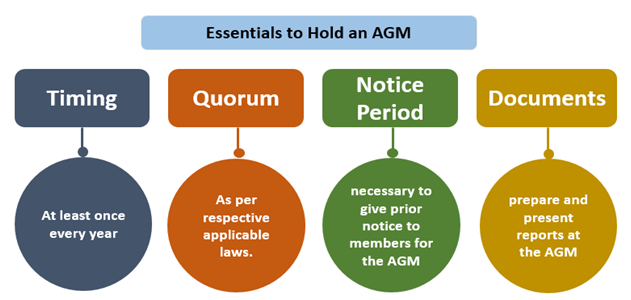What is Annual General Meeting (AGM)?
The AGM, also called the Annual General Meeting, is the year-end gathering of owners, shareholders, and management. It is conducted to hold the company's management answerable for reported performance. For stakeholders, the AGM provides a chance to meet the Key Managerial persons and board of directors who lead the company's operations. It is a chance to participate in critical decisions of the company. For Key managerial persons, the AGM brings in the sense of obligation. It offers directors the opportunity to reveal their vision for the company's future and explain its' past. They get to hear from shareholders directly.
Summary
- An AGM is the yearly assembly of shareholders. Here, directors present the company annual report, and shareholders vote on key businesses.
- It is a chance for the shareholders to participate in a Company's business decisions ask questions to the company's management.
- It is an informative interaction where business managers are held responsible, and stakeholders get to know the plans envisioned for its operations.
Frequently Asked Questions (FAQs)
Why is an AGM Conducted?
The AGM is conducted to provide critical company information to members/shareholders. It is an acknowledgement that members have a right to know mainstream company information from its management.

Copyright © 2021 Kalkine Media
The AGM is conducted to hold directors accountable for the company's performance reports and allow members to question the management on reports issued. It provides a setting for shareholder discussion and deliberation on key business transactions and information made available to them. AGM gives members the chance to interact with the company's vital managerial persons without intermediaries and answer their queries.
Corporations, whether they are publicly listed or private, need to hold an AGM. Even trusts or NGOs need to hold annual meetings to discuss critical matters with their shareholder members. The location and format of the organissation’s annual get together is entirely at its discretion.

Image Source: © Lnc351 | Megapixl.com
For Example, the much-awaited AGM of Berkshire Hathaway is called the 'Woodstock for Capitalists. It is not just attended by members, but a telecast is seen by the public to gauge the future perception of Warren Buffet's markets. Similar is the Case of Apple, where most of the shareholders would attend the conference to see the much-awaited annual new product launch. It is an opportunity for shareholders to question the management.
AGMs of large companies usually gather almost all shareholders who either attend physically or virtually. In contrast, smaller corporations may hold their AGMs with just the minimum number of members required to maintain the meeting.
Which matters are finalized in an AGM?
Several business decisions and course of actions decided by the management are finalized at an AGM, these are:
- Finalizing the annual financial report, including the director's report and the Auditor's report.
- Directors are elected at the AGM, even appointing auditors, and their remuneration is decided at the AGM.
- Maximum remuneration payable to critical managerial persons and Directors is also confirmed.
- Members approve any change in auditors and new appointments of company secretaries.
- Any frauds and risks highlighted as qualifications in audit reports are considered by the shareholders seeking explanations.
- Voting on any unique business is also scheduled in the AGM.
It includes finalizing any changes in the capital structure considering related-party transactions, etc.
What are the essentials to hold an AGM?
To hold an AGM, the following are the essential requirements –

Copyright © 2021 Kalkine Media
- Timing- Directors of a public company need to hold an AGM, usually within 18 months from registration, and at least once every year. The AGM is to be held generally within few months of the corporation's year-end.
- Quorum- The quorum or a minimum number of attending members for an AGM. They participate in the meeting throughout. The number is specified according to the organization type in respective applicable laws. Example Companies Act shall mention quorum for AGM of Public listed companies.
- Notice Period- A company needs to give prior notice to its members for the AGM. This ensures attendance at the AGM. Generally, a listed company needs to provide at least 28 days' notice. Companies can call the meeting at a shorter notice if the law provides or all owners agree.
- Documents- The company needs to prepare and present certain documents at the AGM. These include the Annual report, Directors' declaration and Auditor's statement.
The business in the meeting must be lawfully transacted. The resolutions are required to be moved and passed adequately. Voting on transactions should be proper. Also, the minutes of the meeting are to be adequately prepared.
What are the laws applicable to an AGM?
Organizations must follow all relevant laws, regulations, and guidance before conducting an AGM to make it legally valid. Majorly following need to be considered:
- The Companies or Corporation Act
- Stock Exchange Listing Rules and Regulations.
- The Company's Memorandums and legal deeds.
- Any regional laws applicable
- Any Specific Laws applicable as per the company's business.
- Corporate Governance Principles
- Any other guidelines and rules applicable for conducting AGM
What if AGM doesn’t happen in any year?
If any organization cannot hold an AGM in a given year, it can apply to the registering or regulating authority to extend the time to hold AGM. Using in advance helps avoid fines. Extensions are usually granted for:
- Situations out of the firm's control marking extension essential; or
- If the extension is in the interest of the shareholder members.
Further, the filing is to be done few days before the last date on which the meeting was to be arranged. The regulating authority in this regard requires penal fees or additional charges.
 Please wait processing your request...
Please wait processing your request...